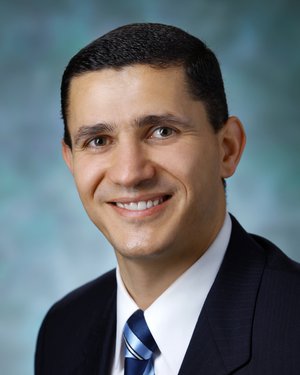-
Ashley Behrens, MD

- Chief, Division of Comprehensive Ophthalmology
- Associate Professor of Ophthalmology
Expertise: Cornea and External Diseases, Comprehensive Ophthalmology
-
Yassine Daoud, MD

- Chair of Ophthalmology. Johns Hopkins Howard County Medical Center
- Associate Professor of Ophthalmology
Expertise: Cornea and External Diseases
-
Divya Srikumaran, MD

- Walter J. Stark, MD Professor of Ophthalmology
- Associate Professor of Ophthalmology
Expertise: Cornea and External Diseases
-
Samuel Chi-Hung Yiu, MD PhD

- Associate Professor of Ophthalmology
Expertise: Cornea and External Diseases
Corneal Collagen Cross-linking
The cornea division at the Wilmer Eye Institute is one the very first ophthalmology centers in the United States to offer corneal collagen cross-linking (CXL). The minimally-invasive, advanced therapy slows down or stops the progression of the corneal deformation of keratoconus and corneal ecstasia.
About the Treatment
This one-time, in-office procedure involves three steps. The ophthalmologist will:
- numb your eye with drops and then gently remove part of the outer layer of your cornea.
- put special vitamin drops (riboflavin) on your eye many times over 30 minutes or more.
- shine a special ultraviolet light on your eye for another 30 minutes and keep adding drops.
The vitamin drops and ultraviolet light work together to make collagen bonds in the cornea stronger, allowing it to become stiffer and usually stop bulging out.
Our CXL Team
Instructions for Your Corneal Cross-linking Treatment
Please note the following in preparation for your procedure:
- Plan to be at the center for approximately 2 hours.
- Your eye drop prescription will be emailed to your local pharmacy or given to you to be filled. Please bring these eye drops with you on the day of your treatment.
- Arrange to have someone take you home on the day of the treatment, and to the post-treatment appointment the following day. Do not plan to drive for approximately one week after treatment.
- Do not wear your contact lenses for 2 weeks prior to your procedure.
- Do not wear any eye make-up, perfumes or after-shave lotion on the day of your procedure; deodorant is fine.
- You may eat a light meal and fluids before your procedure. Keep in mind that your treatment will take at least one hour.
- Vitamin C is not allowed before or after surgery. Keep in mind that vitamin C is abundant in orange juice.
- Feel free to bring an audio player and headphones to listen to while you are being treated.
- We recommend that young children should not accompany you on the day of treatment.
- Do not plan on going on vacation or flying during the month after your procedure. You will not be able to go to swimming pools for a month, and we recommend no water exposure in the first week after surgery. We also recommend minimizing sun exposure in the first month after surgery.

